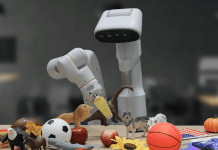AI safety test, adaptability and performance for the real world
Next week is the beginning of 40. International conference on machine learning (ICML 2023), held on July 23-29 in Honolulu, Hawai.
ICML combines the artificial intelligence community (AI) to share new ideas, tools and data sets and make connections with field development. From a computer vision to robotics, scientists from around the world will present their latest progress.
Our director for science, technology and society, Shakir Mohamed, DA Talk about machine learning with social goalsFolding the challenges from healthcare and climate, adopting a social technical view and strengthening global communities.
We are proud to support the conference as a sponsor of platinum and continue working with our long -term partners Latinx in AIIN Queer in AIAND Machine learning women.
We also present demos at the conference AlphafoldOur progress in science fusion and new models such as Palm-e for robotics and Phenaki to generate video from the text.
Google Deepmind researchers present over 80 new articles in ICML this year. Since many articles have been sent before the forces connected to Google Brain and Deepmind, documents initially sent as part of belonging to the Google brain will be included in Google Research BlogWhile this blog contains documents sent as part of belonging to the depth.
Ai in the (simulated) world
The success of artificial intelligence, which can read, write and create, is based on foundation models – AI systems trained in the field of extensive data sets that can learn to perform many tasks. Our latest research studies how we can translate these efforts to the real world and are the basis for more generally talented and incorporated AI agents who can better understand the dynamics of the world, opening new opportunities for more useful AI tools.
We introduce in the oral presentation AdaAI agent, which can adapt to solving new problems in a simulated environment, just like people. Within a few minutes Ada can undertake difficult tasks: connecting objects into an innovator
Similarly, we show how we can use Models in the language of vision that help train incarnate agents – For example, saying a robot what he does.
The future of reinforcement learning
To develop responsible and trustworthy artificial intelligence, we must understand the goals in the center of these systems. In learning to strengthen one way to define this is a reward.
In the oral presentation we try Settle the hypothesis of the prize For the first time Richard Sutton stated, stating that all goals can be considered maximizing the expected cumulative prize. We explain the exact conditions in which it persists, and explain the types of goals that can – and cannot be captured by the prize in the general form of the problem of gaining strengthening.
When implementing AI systems, they must be solid enough for the real world. We watch how better Learning algorithms for strengthening training in restrictionsBecause AI tools often have to be limited to safety and performance.
In our research, which was recognized by means ICML 2023 Outstanding Paper AwardWe examine how we can teach models a complex long -term strategy in uncertainty Imperfect information games. We provide how models can play to win two players games without even knowing the position of the second player and possible moves.
Challenges on the AI border
People can easily learn, adapt and understand the world around us. The development of advanced AI systems that can generalize in a human way will help create AI tools that we can use in our daily lives and face new challenges.
One way to adapt AI is a quick change of forecasts in response to new information. In the oral presentation we look at Plasticity in neural networks And how can you lose it during training – and ways to prevent losses.
We also present studies that can help explain the type of learning in the context that appears in large language models, studying Meta -trained neural networks Sources whose statistics change spontaneously, for example in predicting natural language.
In the oral presentation we introduce a new family of repetitive neural networks (RNN) that achieve better results in long -term tasks Unlock the promise of these models for the future.
Finally in 'Quantile credit assignment“We suggest an approach to disaster happiness from skills. By establishing a clearer relationship between actions, results and external factors, AI can better understand complex, real environments.


















